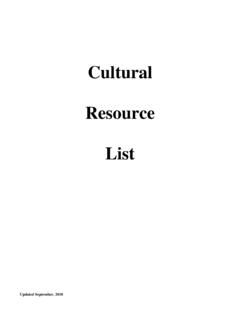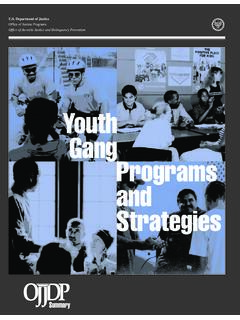Transcription of Grief Loss and Suicide in the Black Community
1 Grief , Loss, and Suicide in the Black Community Kimberly Carroll, LLMSW. &. Carly King, MSSW, LSW. Introduction of Presenters Kimberly Carly Kimberly Carroll, she/her/hers, LLMSW, is a licensed Social Carly King, MSSW, LSW (she/her/hers) is a licensed social Worker in the state of Michigan. Kimberly received her BSW worker who holds a Bachelor of Arts in Psychology from and MSW from Western Michigan University with a focus in Temple University and a Master of Science in Social Work Interpersonal Practice. Kimberly was awarded the NASW with a concentration in policy practice from Columbia BSW Student of the Year in 2016 and currently works as the University.
2 A Baltimore area native, Carly has resided in Housing Manager for the YWCA Kalamazoo. Kimberly began Philadelphia, PA for over 17 years. Her professional her work in Suicide prevention in 2013 working as a core background is in child welfare with a specialization in team member on Western Michigan University's adoption and older foster youth and she has a robust Campus-Wide Suicide Prevention Program.' In 2013, history in training and non-profit management. Carly Kimberly and the core team were awarded by WMU's recently joined Widener University's Center for Social School of Social Work for their poster and presentation on Work Education as the Assistant Director of the Online Connectedness Building.
3 In 2019, to continue building her MSW Program. She facilitates training, workshops, and skillsets, Kimberly completed Mental Health First Aid USA' psychoeducation around topics of Grief and loss, trauma, training via the National Council for Community Behavioral transracial adoption, attachment, LGBTQIA+ topics, Healthcare. Kimberly is an enthusiastic change maker and physical, and mental health as well. Outside of work, founded the Social Work Community in July 2021 where she Carly enjoys being an adoptive mom, a plant and pet is passionate about creating opportunities for engagement, momma, reading, cooking, and traveling!
4 Connection, and resource sharing within the Community . Learning Objectives After participating in the session, attendees should be able to: Identify one or more resources for locating a therapist or mental health provider in their Community . Be able to recognize the impact the COVID-19 pandemic has had on rising mental health concerns. Differentiate between supportive conversation vs toxic positivity related to Grief , healing, and mental well being. Grief , Loss & Trauma: An Overview Loss can be traumatic Grief is not linear Signs/Symptoms: physiological, memory, fatigue/energy, overworking, anxiety, depression, guilt, anger We do not all grieve the same Traumatic loss and complex Grief at different ages and stages may have varying effects on our mind/body/lives We experience Grief /loss due to death + also so much more Ambiguous Loss Ambiguous Loss Coined by Pauline Boss- 1990's Ambiguity, lack of closure', inability to observe rituals, unclear about future Two types.
5 Physically Absent, yet psychologically present , missing soldiers, kidnapped children, adoptive families, divorce/separation/. estrangement Psychologically absent, yet physically present , a person with Alzheimer's, severe head trauma, substance use/misuse, severe mental illness Disenfranchised Grief Doka (1989) describes the Grief that person's experience when they incur a loss that is not or cannot be openly acknowledged, publicly mourned, or socially supported (Amara, ). Prolonged Grief Disorder Racial trauma is the ongoing result of racism, racist bias, and exposure to racist abuse in the media.
6 Racial trauma can affect many aspects of a person's life, including their ability to have relationships, Racial concentrate on school or work, and feel safe.. Trauma & Can cause symptoms like Post Traumatic Stress Disorder (PTSD). Race Based Can result from discrimination experienced directly or indirectly, microaggressions, microassaults, microinvalidations, etc. Traumatic Chronic exposure, prolonged exposure, can worsen or complicate racial trauma Stress In the , if systemic and individual racism continue to exist, BIPOC individuals will experience racial trauma.
7 Intersect: Collective, historical, and intergenerational trauma When the Helpers Need Help Mental Health and the Black Community Why don't Black folxs seek out mental health services? High Costs of Mental Health Familial Shame Around Mental Health Cultural Stigma of Mental Illness Lack of Diversity in Health Care, Racism Lack of Competency about Black Life Among Non- Black Clinicians Whiteness as a Foundation to Mental Health Care Distrust of the Medical Industry Difficulty Navigating the Process Emotional Hesitation Negative Past Experiences This leads to an increase in mental health concerns for Black individuals that often do not get addressed which can lead to increase risk of depression, anxiety.
8 And Suicide in our Community . Addressing Mental Health in the Black Community . February 8, 2019. Roughly 37 million people, identify as Black or African American in the United States. Research suggests that the adult Black Community is 20% more likely to experience serious mental health problems, such as Major Depressive Disorder or Generalized Anxiety Disorder. Additionally, Black emerging adults (ages 18-25) also experience higher rates of mental health problems and lower rates of mental health service utilization compared to White emerging adults, and older Black adults.
9 Impact on Mental Health from COVID-19 so far Negatively affected mental health and created new barriers for people already suffering from mental illness and substance use disorders. Black adults (48%) are more likely to report symptoms of anxiety and/or depressive disorder Compared to nonessential workers, essential workers are more likely to report symptoms of anxiety or depressive disorder (42% vs. 30%), starting or increasing substance use (25% vs. 11%), and suicidal thoughts (22% vs. 8%) during the pandemic. Negatively affected people's well-being, such as difficulty sleeping (36%) or eating (32%), increases in alcohol consumption or substance use (12%), and worsening chronic conditions (12%), due to worry and stress over the coronavirus.
10 Job loss Loss of support, closure of schools, including childcare facilities Loss of celebrating important milestones like Graduation, Closures of Universities Increase in social media consumption, negative impacts on self esteem Isolation Black individuals have a cultural history of not seeking out mental health services, and for good reason, but with the negative impact that we have seen COVID-19 take so far, it is not healthy for people in our Community to continue to ignore or deny mental health services. But how can we combat systemic barriers?




